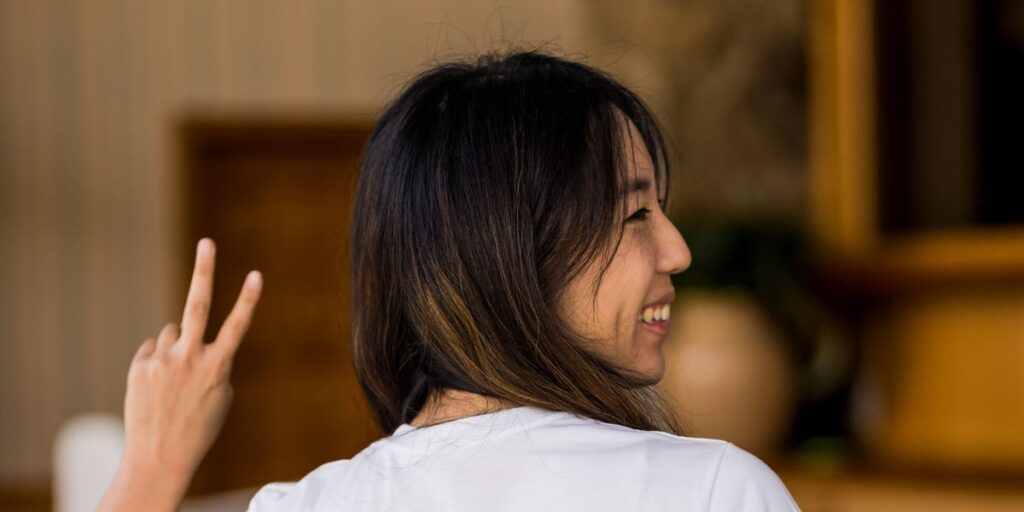This as-told-to essay is based on a conversation with Ginny Wu, 32, a Taiwanese-American UCLA graduate living in Taiwan. Her words have been edited for length and clarity.
For my dad’s generation, the American dream was about building a better future for their kids.
My uncle was the first in his family to get a green card. He eventually sponsored his siblings, including my dad, to leave Taiwan and move to the US.
I was born and raised in the States, and never expected that, decades later, I’d end up moving in the opposite direction — back to Taiwan, where their journey had begun.
I grew up in a small town
Both of my parents are from Taitung, a rural county in southeastern Taiwan. My paternal grandpa was the county magistrate there, and my grandma ran a rice mill business. My dad moved to America in the late 1970s.
A job opportunity brought him to Santa Clara, before he moved to Anaheim and then Texas, where he co-ran a motel and even managed an emu ranch.
He traveled back to Taiwan to get married, and in 1988, my mom joined him in the US.
I was born and raised in Norco, a small, rural town in Southern California. My dad loved the countryside and bought a house there. The town wasn’t very diverse, and I was often one of just a few Asian kids in my class. I feel fortunate that I never really experienced racism growing up.
At home, we spoke Mandarin. I hated studying the language as a kid, but now I’m grateful — I use Mandarin every day.
An assignment changed the way I view identity
Growing up, I didn’t think much about what being Asian actually meant. I’d say I was Chinese — partly because we spoke it at home, partly because that’s what teachers checked on school forms.
That changed in high school, when I started the International Baccalaureate program. I wrote my extended essay on how Japanese colonization shaped Taiwanese identity.
None of my previous history classes had covered that Taiwan was occupied by Japan for 50 years — my parents never went through it in depth either
But the topic hit home. It helped explain why my dad said Japanese phrases before meals, and why my parents used Japanese loanwords without realizing. Exploring the Japanese influences helped me make sense of it all.
Exploring that influence deepened my understanding of Taiwan’s story, and my own.
That essay planted a seed.
A few months after graduating from UCLA with a degree in economics, I was hired by Northrop Grumman, an aerospace and defense company.
Over the next four years, I worked as a financial analyst in a professional development program rotation. In my last rotation, I pivoted to a different track, taking on a role as a business process analyst in aerospace systems.
Despite having a stable job, I started to feel boxed in. I’d never lived anywhere else, and I wanted to see what life outside Southern California could be like.
The first move
That desire led me to join Anchor Taiwan, a one-month startup immersion program, in 2018. I took time off work to attend, and it changed everything.
Experiencing Taiwan as an adult, without my parents and surrounded by peers, helped me imagine building a life here. By the end of the year, I’d quit my job, packed up, and moved to Taipei.
I didn’t have a job lined up at first. I enrolled in Mandarin classes while job hunting and eventually landed a role at Taiwan Startup Stadium. That was my entry point into the local tech world.
When I told my parents I was moving, my mom wasn’t thrilled. Having grown up during financially unstable times in Taiwan, she valued career stability and didn’t love the idea of me quitting.
But she also knew I hadn’t felt fulfilled. While they weren’t exactly enthusiastic, they were supportive. I was lucky to have extended family in Taiwan — I stayed at my aunt’s place while getting settled. I also applied for full Taiwanese citizenship so I could vote and now have my Taiwan ID.
Taipei reshaped me
I used to be a homebody, like my parents, but the city has drawn out a more social, spontaneous side. My closest friends are mostly locals who speak incredible English, and I feel more connected to my extended family than ever.
Work-wise, the transition’s actually been smoother than I thought. I’m not at a traditional local company, though — I’ve heard those can be pretty hierarchical and intense.
Taipei has pushed me out of my bubble in the best way. It’s clean, convenient, and safe. I walk or bike alone at night without a second thought. I take the bus to work, meet friends for dinner or to go rock climbing, and sometimes jog around the track near my office.
Of course, there are things I miss about the US. My parents — now in their 70s and 80s — are still there, and they’ve never visited me in Taiwan.
But I used to get anxious about the smallest things, like mailing a package or ordering a meal. Now, I navigate life in a new language, in a system I didn’t grow up in. I’ve built something from scratch, and that feels like home.
I dream of launching a business here one day.
Got a personal essay about moving to Asia that you want to share? Get in touch with the editor: akarplus@businessinsider.com.
Read the full article here


